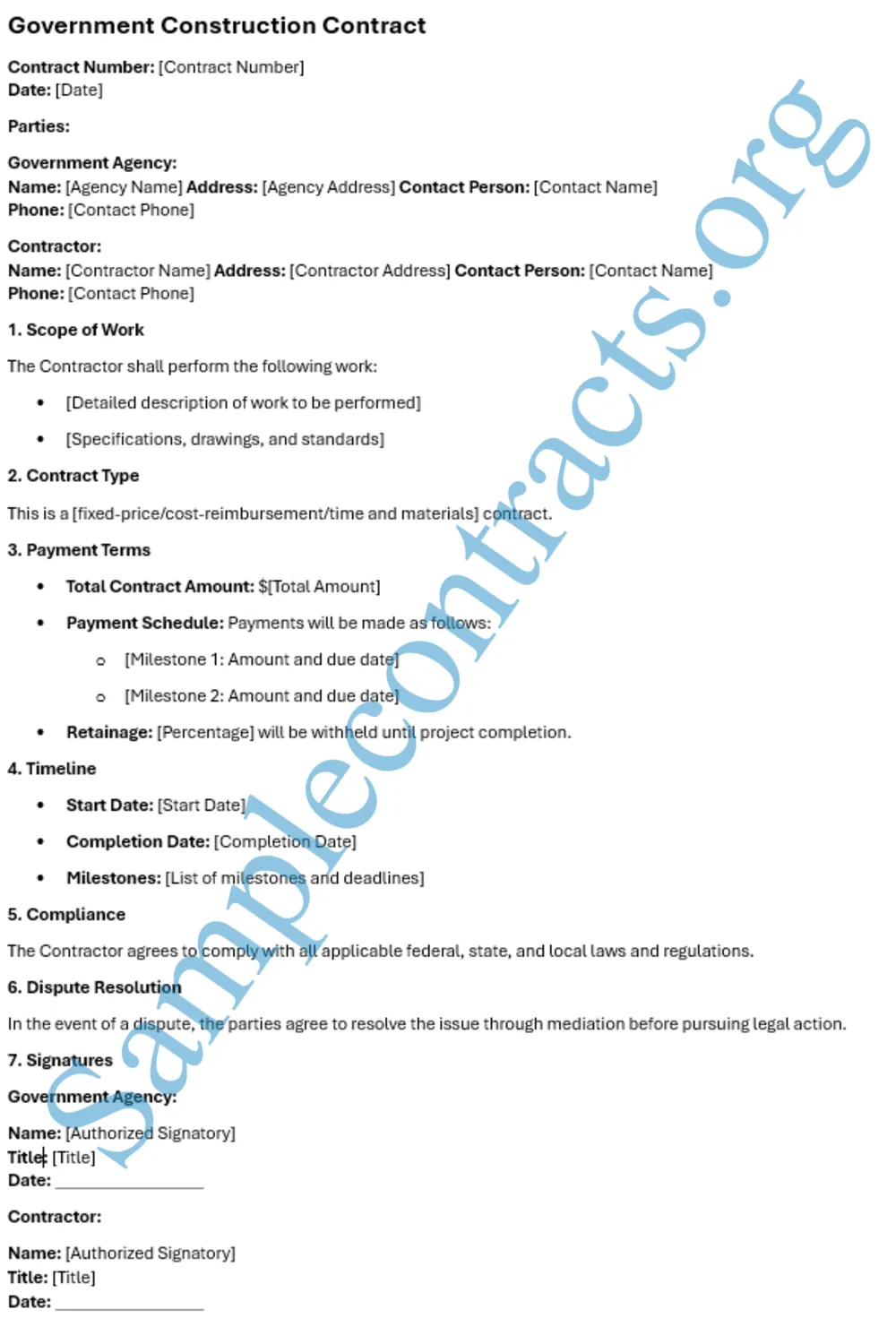Step-by-Step Guide for Creating a Government Construction Contract
Step 1: Understand the Requirements
- Research Regulations: Familiarize yourself with federal, state, and local regulations governing government contracts, including the Federal Acquisition Regulation (FAR) if applicable.
- Identify Funding Sources: Determine how the project will be funded and any specific requirements tied to that funding.
Step 2: Define the Scope of Work
- Detailed Description: Clearly outline the work to be performed, including specifications, drawings, and any relevant standards.
- Project Timeline: Include milestones and deadlines for project completion.
Step 3: Determine Contract Type
- Select Contract Type: Choose between fixed-price, cost-reimbursement, time and materials, or other types of contracts based on the project needs and risk assessment.
Step 4: Establish Payment Terms
- Payment Schedule: Define how and when payments will be made (e.g., upon completion of milestones, monthly).
- Retainage: Specify any retainage amounts that will be withheld until project completion.
Step 5: Include Legal Provisions
- Compliance Clauses: Include clauses that require compliance with applicable laws, regulations, and safety standards.
- Dispute Resolution: Outline the process for resolving disputes, including mediation or arbitration.
Step 6: Draft the Contract
- Use Clear Language: Write the contract in clear, concise language to avoid ambiguity.
- Include Essential Elements: Ensure the contract includes all necessary elements such as parties involved, scope of work, payment terms, and legal provisions.
Step 7: Review and Revise
- Internal Review: Have the contract reviewed by legal counsel and relevant stakeholders within the government agency.
- Revise as Necessary: Make any necessary revisions based on feedback.
Step 8: Execute the Contract
- Signatures: Ensure that all parties sign the contract, including any required witnesses or notaries.
- Distribute Copies: Provide copies of the signed contract to all parties involved.
Sample Government Construction Contract
Government Construction Contract
Contract Number: [Contract Number]
Date: [Date]
Parties:
Government Agency:
Name: [Agency Name]
Address: [Agency Address]
Contact Person: [Contact Name]
Phone: [Contact Phone]
Contractor:
Name: [Contractor Name]
Address: [Contractor Address]
Contact Person: [Contact Name]
Phone: [Contact Phone]
1. Scope of Work
The Contractor shall perform the following work:
- [Detailed description of work to be performed]
- [Specifications, drawings, and standards]
2. Contract Type
This is a [fixed-price/cost-reimbursement/time and materials] contract.
3. Payment Terms
- Total Contract Amount: $[Total Amount]
- Payment Schedule: Payments will be made as follows:
- [Milestone 1: Amount and due date]
- [Milestone 2: Amount and due date]
- Retainage: [Percentage] will be withheld until project completion.
4. Timeline
- Start Date: [Start Date]
- Completion Date: [Completion Date]
- Milestones: [List of milestones and deadlines]
5. Compliance
The Contractor agrees to comply with all applicable federal, state, and local laws and regulations.
6. Dispute Resolution
In the event of a dispute, the parties agree to resolve the issue through mediation before pursuing legal action.
7. Signatures
Government Agency:
Name: [Authorized Signatory]
Title: [Title]
Date: __________________
Contractor:
Name: [Authorized Signatory]
Title: [Title]
Date: __________________
Notes:
- Customization: Be sure to customize the template with specific details relevant to the investment, including the names of the parties, investment amount, and any other pertinent information.
- Legal Review: It is advisable to have the contract reviewed by a legal professional to ensure compliance with local laws and regulations.
- Clarity: Ensure that all terms are clear and unambiguous to avoid potential disputes in the future.
Advice for Creating a Government Construction Contract
Consult Legal Experts
Always consult with legal experts familiar with government contracts to ensure compliance and protect your interests.
Be Specific
The more specific you are in the scope of work and terms, the less room there is for disputes later.
Document Everything
Keep thorough records of all communications, changes, and approvals throughout the project.
Understand the Procurement Process
Familiarize yourself with the procurement process of the government agency to ensure compliance with bidding and award procedures.
Plan for Contingencies
Include provisions for unforeseen circumstances that may affect the project timeline or costs.
By following these steps and utilizing the sample contract, you can create a comprehensive and legally sound government construction contract that meets the needs of all parties involved.


